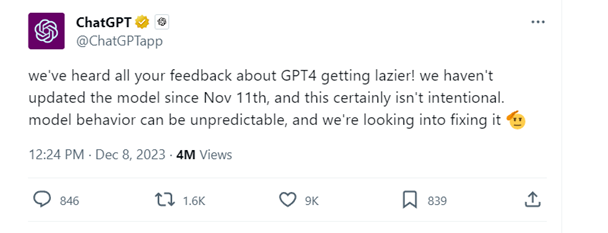OpenAI Admits ChatGPT Has Become Lazy, User Complaints Increase
-
OpenAI's ChatGPT account recently acknowledged the issue of GPT-4 becoming lazy and stated they are working on fixing it. Since November 11th, the ChatGPT account has not updated the model, resulting in a sharp increase in user feedback. Although this was not intentional, the behavior of large models is unpredictable.
There is speculation that OpenAI has limited certain functionalities of GPT-4 to save computational resources and reduce the output of illegal content. This issue has also caused dissatisfaction among users, who have shared evidence of ChatGPT's laziness on social media, supporting the possibility that OpenAI is testing new reasoning methods.

In their feedback, users pointed out that ChatGPT has become lazy in answering questions, providing only partial responses and leaving the rest for users to figure out themselves. For example, when asked about all weekends from now until May 5, 2024, ChatGPT only mentioned there are approximately 24 weeks without listing each one in detail. Users expressed frustration, noting that even with more specific requests, ChatGPT still fails to provide complete answers. This has led to speculation that OpenAI may be making ChatGPT increasingly lazy to save on computational costs.
From a technical perspective, a user named Jonathan proposed some possible explanations. He believes OpenAI might be testing new inference methods, or hosting models with different context sizes, while avoiding wasting computational power on trivial and uninteresting queries.
Additionally, OpenAI's main internal network remains consistent across different GPT-4 contexts, causing multiple models to share the same core and private data. To save runtime, each model performs inference steps on inputs before being called, rather than updating on-demand during calls. Furthermore, OpenAI has trained an additional core network specifically to return concise content within 850-1024 inference steps. Collectively, these explanations suggest OpenAI is making ChatGPT appear "lazy" to reduce computational costs.
However, this issue has drawn user dissatisfaction and criticism. On Google's App Store, ChatGPT has received numerous 1-star ratings. Even OpenAI's company address on Google Maps has been targeted with 1-star protests specifically due to ChatGPT's perceived laziness. Users expect more specific and accurate responses rather than vague information. For OpenAI, fixing ChatGPT's laziness problem has become an urgent task requiring prompt solutions to improve user satisfaction and experience.
